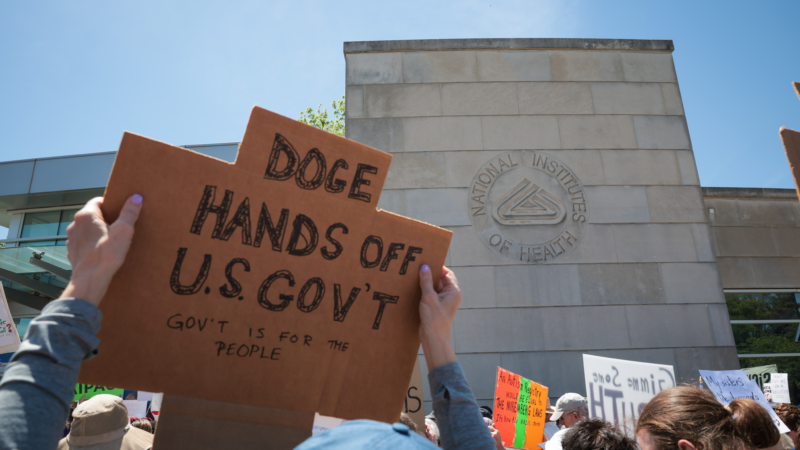A federal judge further halts Trump’s radical transformation of government
A federal judge in San Francisco has indefinitely paused President Trump’s sweeping overhaul of the federal government.
U.S. District Judge Susan Illston issued the preliminary injunction late Thursday, nearly two weeks after temporarily halting Trump’s Feb. 11 executive order directing agencies to shut down offices and lay off thousands of people.
A coalition of labor unions, nonprofits and local governments had sued to block that executive order and the subsequent memo issued by the Office of Management and Budget and the Office of Personnel Management instructing agencies on how to carry out Trump’s order. The plaintiffs argued that Trump lacks the authority to carry out such a radical transformation of government without approval from Congress.
Illston agreed, writing that “agencies may not conduct large-scale reorganizations and reductions in force in blatant disregard of Congress’s mandates, and a President may not initiate large-scale executive branch reorganization without partnering with Congress.”
She noted that over the last century, nine presidents have sought and obtained authority from Congress to reorganize the executive branch. She pointed out that others, including Trump in his first term, sought approval but were not granted it.
The lawsuit named Trump, Elon Musk and his Department of Government Efficiency, the heads of 21 federal agencies and those agencies themselves as defendants.
Illston’s order stops those agencies from issuing new reorganization plans and new layoff notices. It also prevents agencies from formally separating those who have already received such notices and are currently on administrative leave.
She wrote that in some cases, the evidence showed that agencies were making changes that “intentionally or negligently” flout the duties given to them by Congress, which funds them.
She cited as examples reports that the National Oceanic and Atmospheric Administration, the Department of Housing and Urban Development, AmeriCorps and the National Science Foundation are planning to cut 50% or more of their employees, while the IRS and the Small Business Administration may cut 40%.
“After dramatic staff reductions, these agencies will not be able to do what Congress has directed them to do,” she wrote.
Illston stopped short of requiring agencies to bring people already laid off or placed on administrative leave back to work while the litigation continues.
The Trump administration is expected to appeal her latest decision. The government had already appealed Illston’s earlier, temporary order to the 9th Circuit Court of Appeals and also asked the Supreme Court to intervene. The government is arguing that Trump’s executive order and the OMB and OPM memo serve only to “facilitate” reductions in force (RIFs), or mass layoffs, within agency workforces.
“Agencies have express statutory authority to conduct RIFs, and the President may tell agencies to use their own statutory authorities to accomplish policy goals,” government attorneys wrote.
Judge Illston’s preliminary injunction applies to the following agencies:
- Office of Management and Budget
- Office of Personnel Management
- Department of Agriculture
- Department of Commerce
- Department of Energy
- Department of Health and Human Services
- Department of Housing and Urban Development
- Department of the Interior
- Department of Labor
- Department of State
- Treasury Department
- Department of Transportation
- Department of Veterans Affairs
- AmeriCorps
- Environmental Protection Agency
- General Services Administration
- National Labor Relations Board
- National Science Foundation
- Peace Corps
- Small Business Administration
- Social Security Administration
- Department of Government Efficiency (not a formally established government agency)
Scientists make a pocket-sized AI brain with help from monkey neurons
A new study suggests AI systems could be a lot more efficient. Researchers were able to shrink an AI vision model to 1/1000th of its original size.
U.S. evacuates diplomats, shuts down some embassies as war enters fourth day
The United States evacuated diplomats across the Middle East and shut down some embassies as war with Iran intensified Tuesday while President Trump signaled the conflict could turn into extended war.
College students, professors are making their own AI rules. They don’t always agree
More than three years after ChatGPT debuted, AI has become a part of everyday life — and professors and students are still figuring out how or if they should use it.
Kristi Noem set to face senators over DHS shutdown, immigration enforcement
The focus of the hearing is likely to be on how Kristi Noem is pursuing President Trump's mass deportation efforts in his second term, after two U.S. citizens were killed by immigration officers.
North Carolina and Texas have primary elections Tuesday. Here’s what you need to know
The midterm elections are officially underway and contests in Texas and North Carolina will be the first major opportunity for parties to hear from voters about what's important to them in 2026.
Trump promised the MAGA base no new wars. Then he went to war with Iran
President Trump promised his "Make America Great Again" voters an "America First" foreign policy. With the war in Iran, he's testing MAGA world's willingness to be flexible on one of its core beliefs.








